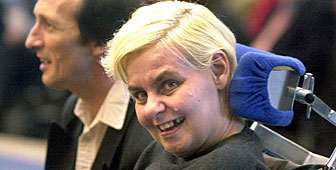Euthanasia loopholes yet to be closed

Two high profile cases have again thrust euthanasia and assisted suicide into the spotlight. In Switzerland, the right to die remains a grey area.
The two cases in Britain showed that while euthanasia remains illegal, there is a grey area regarding assisted suicide, and this applies to Switzerland, which has similar laws on the issue.
On Monday, the European court of human rights upheld a British court ruling that the husband of Diane Pretty, a motor neurone disease sufferer, would not be immune from prosecution if he helped her to die.
On the same day, another terminally ill British patient, named only as Miss B, died after asking doctors to withdraw treatment.
While one woman was granted the right to choose the time of her death, the other, because of her physical condition, has been condemned to live. The situation would have been the same in Switzerland, says Margrit Leuthold, secretary general of the Swiss Academy of Medical Sciences.
“In the case of Mrs Pretty, the husband would face gaol, as he would in Britain,” she told swissinfo.
Slippery slope
“Cases like this, where the patient is not able to commit the final act themselves, are extremely rare. I can see that a change in the law might be a slippery slope,” she told swissinfo.
However desperately moving Diane Pretty’s case, it could not be judged in isolation. The Strasbourg ruling was watched intently in Switzerland, as in the whole of Europe. Had the court overruled the British verdict, it would have had implications for every country.
“I can understand the need for compassion. I can see the suffering and the will to die, but the protection of the life of a human being is one of the very basic ethical principles of Western society, and laws have to protect society and values,” Leuthold says.
The question of euthanasia has become especially sensitive in Switzerland since a male nurse confessed last year to having killed 27 elderly and infirm patients at convalescent homes in Lucerne. He said he had acted out of compassion.
Earlier, amid outcry from doctors’ and religious groups, Zurich city council decided to allow assisted suicide in its nursing homes. Those behind the decision argued that the terminally ill should have the right to choose how and when to end their lives.
Risking prison
No one is under any illusion that active euthanasia takes place in Swiss hospitals, but doctors who help a patient to die risk several years in prison.
Many doctors take exception to the ban on euthanasia on the grounds that prolonging life unnecessarily, especially when it causes increased suffering, is itself unethical. One such is Franco Cavalli, a leading member of the Social Democratic Party and a top cancer specialist.
Dignified end
“Palliative care has improved immensely, but we are still not able to ensure a dignified end for many patients, who can’t even be helped to die by their loved ones,” he says.
However, a proposal by Cavalli to decriminalise euthanasia for terminally ill patients was rejected by the Swiss federal parliament last December, though deputies did call on the government to fill the “legislative void” in this area.
For, while euthanasia is still banned, there is a grey area regarding assisted suicide. A loophole in the Swiss law allows trained councillors to prepare a lethal dose of drugs, as long as they do not administer it.
This, like “indirect active euthanasia” – the administering of high doses of painkilling drugs like morphine and “passive euthanasia” – the withholding of life-saving treatment – is tolerated.
“Whenever we assist a suicide it is perfectly legal,” says a spokesman for the pro-euthanasia organisation, Dignitas. “We would be prepared to help Diane Pretty, if she wanted to die.”
But that would only be legal if she were able to administer the fatal dose herself.
Exit, an organisation which champions patients’ right to die, says that allowing passive or indirect active euthanasia but not direct active euthanasia is hypocritical, since all have the same explicit purpose – ending a person’s life.
Elsewhere in Europe, only the Netherlands has legalised active euthanasia, but only according to very strict criteria.
by Roy Probert

In compliance with the JTI standards
More: SWI swissinfo.ch certified by the Journalism Trust Initiative
You can find an overview of ongoing debates with our journalists here . Please join us!
If you want to start a conversation about a topic raised in this article or want to report factual errors, email us at english@swissinfo.ch.